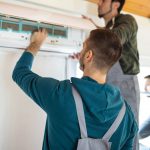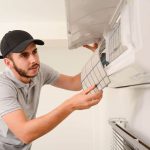Maintaining an air conditioning (AC) system is crucial for ensuring optimal performance, energy efficiency, and longevity. By following a few key AC maintenance tips, homeowners can keep their systems running smoothly and avoid unexpected breakdowns, especially during the hot summer months. This comprehensive guide provides valuable insights and actionable advice on AC maintenance.
Regularly Replace or Clean Air Filters
Change or Clean Filters: Replace or clean the AC filters every 1-3 months. Dirty filters reduce airflow and efficiency.
Inspect the Thermostat: Ensure your thermostat is working correctly and consider upgrading to a programmable one for better energy management.
Clean the Coils: Evaporator and condenser coils collect dirt over time. Clean them annually to maintain efficient heat absorption.
Check the Fins: Ensure the aluminum fins on evaporator and condenser coils are straight. Use a fin comb if necessary to correct any bends.
Inspect the Condensate Drain: Clear the condensate drain channels to prevent clogs that can cause water damage or increase indoor humidity.
Schedule Professional Maintenance
Schedule Annual Professional Checkups: Hire a professional technician to inspect and tune-up your AC system annually. They can check refrigerant levels, test for leaks, and ensure all components are functioning properly.
Check Ductwork for Leaks: Have a professional inspect and seal any leaks in the ductwork to improve efficiency and cooling performance.
Operational Tips
Keep the Outdoor Unit Clean: Ensure the area around the outdoor unit is free of debris, leaves, and dirt. Keep vegetation trimmed to allow adequate airflow.
Use Fans to Circulate Air: Use ceiling fans to help circulate cool air more effectively, reducing the load on your AC system.
Set the Right Temperature: Avoid setting your thermostat too low. Aim for a comfortable temperature, typically between 72-78°F (22-26°C).
Energy Efficiency
Install a Programmable Thermostat: A programmable thermostat can help you manage cooling more efficiently, reducing energy consumption when you’re not home.
Seal and Insulate Your Home: Ensure your home is well-sealed and insulated to prevent cool air from escaping and warm air from entering.
Seasonal Tips
Before the cooling season starts, check your AC system and perform necessary maintenance. In the off-season, cover the outdoor unit to protect it from debris.
Clean the Condenser Coils
Over time, the condenser coils can accumulate dirt and debris, which can hinder their ability to dissipate heat. Cleaning the coils at least once a year is vital for maintaining the system’s efficiency. This task involves carefully removing any dirt or debris from the coils and ensuring they are free from obstructions.
Check the Refrigerant Levels
Proper refrigerant levels are essential for the efficient operation of an AC system. Low refrigerant levels can indicate a leak or other issue that requires professional attention. Regularly checking and maintaining the correct refrigerant levels helps ensure the system operates efficiently and effectively.
Ensure Proper Thermostat Settings
Proper thermostat settings can significantly impact the performance and efficiency of an AC system. It is advisable to set the thermostat to a comfortable yet energy-efficient temperature. Additionally, using a programmable thermostat can help optimize cooling schedules and reduce energy consumption.
Keep the Outdoor Unit Clear
The outdoor unit of an AC system needs adequate airflow to function correctly. It is essential to keep the area around the unit clear of debris, plants, and other obstructions. Regularly inspecting and cleaning the outdoor unit helps ensure optimal airflow and prevents potential issues.
Frequently Asked Questions (FAQs)
How often should I replace my AC air filters?
It is recommended to replace or clean your AC air filters every 30 to 60 days, depending on usage and the type of filter. Homes with pets or individuals with allergies may require more frequent filter changes.
What are the benefits of professional AC maintenance?
Professional AC maintenance ensures that your system is thoroughly inspected, cleaned, and tuned up. This helps maintain efficiency, prevent breakdowns, and extend the lifespan of your unit.
Can I clean the condenser coils myself?
Yes, you can clean the condenser coils yourself by carefully removing any dirt and debris. However, it is advisable to consult the unit’s manual or hire a professional if you are unsure about the process.
How can I tell if my refrigerant levels are low?
Signs of low refrigerant levels include reduced cooling performance, hissing sounds from the unit, and ice buildup on the evaporator coils. If you suspect a refrigerant issue, contact a professional technician for an inspection.
What temperature should I set my thermostat to for optimal efficiency?
Setting your thermostat to around 78°F (25-26°C) when you are home and higher when you are away can help optimize efficiency. Using a programmable thermostat allows you to set different temperatures for different times of the day.
How can I improve the airflow around my outdoor unit?
To improve airflow around the outdoor unit, ensure that there is at least 2-3 feet of clear space around it. Regularly remove any leaves, dirt, or debris, and trim any nearby plants or shrubs.
By following these AC maintenance tips and addressing common questions, homeowners can keep their systems running efficiently and effectively, ensuring comfort and reliability throughout the year. Regular maintenance not only enhances performance but also helps prevent costly repairs and extends the lifespan of the unit.



